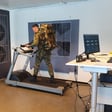
Josh - Prosthetist
Sometimes we are born into a situation that seems bleak but as we move thru life, it becomes our greatest strength. When Josh was very young, he had to have his foot amputated and now, he helps create prosthetics for other folks that need them. Josh has a unique insight into what the end user experiences and he can cater his approach. In this interview, we talk about the design process, the fitment, the materials typically used, how prosthetic devices work, as well as the cutting edge advancements in Prosthetics. Of course, like we always do on the jobs podcast, we dive into the details of pay, education needed and what makes a successful prosthetist. This was really a unique dive into a topic most of us know very little about. SO if you want to get into this line or work, or you just want to learn something new, this is the episode you do not want to miss.
If you enjoyed this content and would like to support the channel, you can do so HERE. Thanks!



















